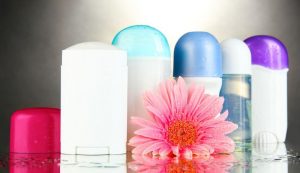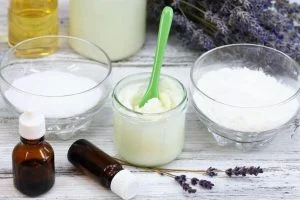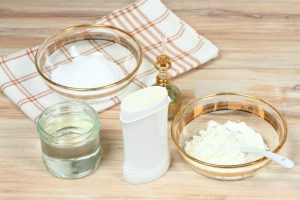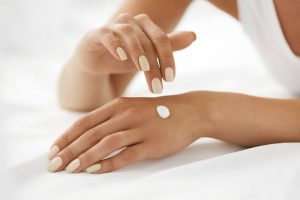There are many advantages to using a DIY deodorant: If you have sensitivities to the chemicals in industrial products, you can choose the ingredients that you put into your homemade deodorant. With the help of a skin patch test, you can root out any bothersome ingredients and substitute something else. And you can use natural ingredients that smell great, are safe on skin, are shelf-stable and will eliminate odors.
What Is The Cause Of Intense Body Odor When You Sweat?
 Armpits are a breeding ground for bacteria. So are our feet, groin, genitals and belly button.
Armpits are a breeding ground for bacteria. So are our feet, groin, genitals and belly button.
Bacteria live on our skin and all over our body. When the apocrine gland in our underarms produces sweat-like secretions, the bacteria living on our skin multiply rapidly.1 Body odor occurs when these bacteria break down their secretions into acids. The resulting acids cause our bodies to give off an unpleasant odor.2
When this happens, you probably jump for the deodorant or antiperspirant.
Check The Ingredients In Your Deodorant And/Or Antiperspirant: Do They Contain Harmful Ingredients?
 At first glance (or first smell), a deodorant or antiperspirant may seem harmless: The only job of a deodorant is to keep your body odor from smelling too rancid. And the only job of an antiperspirant is to reduce the amount of sweat you produce. Sometimes these are combined into one product.3 But look at the ingredients on the back of the deodorant and/or antiperspirant container. You may notice many that are difficult to pronounce or sound like they were produced in a chemistry lab.
At first glance (or first smell), a deodorant or antiperspirant may seem harmless: The only job of a deodorant is to keep your body odor from smelling too rancid. And the only job of an antiperspirant is to reduce the amount of sweat you produce. Sometimes these are combined into one product.3 But look at the ingredients on the back of the deodorant and/or antiperspirant container. You may notice many that are difficult to pronounce or sound like they were produced in a chemistry lab.
Deodorants often contain harmful or potentially harmful ingredients. These include:
Aluminum
Frequent use may cause aluminum to accumulate in female breast tissue, with potential health risks.4,5
Parabens
Frequently used as a preservative. It is a potential endocrine disruptor.6,7 It has also been known to cause allergic reactions.
Propylene Glycol
 Used as a moisturizer, antiseptic, and preservative. However, it may cause allergic reactions in some consumers.
Used as a moisturizer, antiseptic, and preservative. However, it may cause allergic reactions in some consumers.
Fragrance
Used to increase deodorant marketability and mask underarm odors. But it appears to be a very common allergen in users of deodorant products.8
There is a better solution than using store-bought deodorants with allergens and chemical irritants.
You Can Make Your Own Homemade Deodorant Recipe: The Common Ingredients

If your deodorant makes you uncomfortable, causes skin sensitivities, or you simply want a more natural product, homemade deodorant might be the way to go. With a DIY deodorant, you know what’s inside the product.
Here are the most common building blocks of a DIY natural deodorant. With these, you can make just about any homemade deodorant that works.
Baking Soda
Baking soda has been used anecdotally to remove odors for centuries. It has properties that potentially aid in absorbing sweat and neutralizing odors.9 However, it may also irritate the skin and cause discoloration in some people.10
 Shea Butter
Shea Butter
This is a tree extract used by ancient and traditional African cultures for its many medicinal, culinary, and cosmetic applications.11,12 It has powerful antioxidant properties and is high in vitamin E.13,14
Candelilla Wax
A vegan alternative for beeswax, with a higher melting point.15 It contains vitamin A, which support skin hydration.16
Carrier Oils
The purpose of carrier oils is to dilute essential oils and “carry” them onto your skin.17 There are many types, including:
- Coconut oil is the most common carrier oil with homemade deodorants. Only use the raw, unrefined, virgin coconut oil.18 Coconut oil is used both as a binding agent and as a carrier oil.
-

Jojoba oil is hypoallergenic, acts as a moisturizer, and does not block pores.19
- Almond oil has been used to support a healthy complexion and skin tone.20
Essential Oil
An essential oil is a concentrated plant extract used to mask unpleasant odors and add aroma. Essential oils often retain the natural smell and flavor of their source.21,22 Common essential oils include lavender oil and tea tree oil. Since essential oils are so concentrated, they need to be diluted by a carrier oil such as the ones mentioned above.
DIY Deodorant Recipes To Help Fight Body Odor
DIY Deodorant Recipes
This is a simple DIY deodorant recipe with natural ingredients:
Ingredients
- 2 cups baking soda
- 2 cups arrowroot starch
- 5 Tbsp unrefined coconut oil
- 20 drops of essential oil: tea tree oil and lavender oil
 Instructions
Instructions
- Mix baking soda and arrowroot together using a blender
- Add coconut oil and essential oils; mix well
- Pour into a clean, air-tight jar.
This homemade deodorant should last 3-6 months in the air-tight container.23
Here is another all-natural deodorant that you can make at home:
Ingredients
- ⅛ cup baking soda
- ⅓ cup arrowroot powder
- ½ cup jojoba oil
- ½ cup unrefined shea butter
- ¼ cup candelilla wax
- 10-20 drops of essential oils
 Melting options for candelilla wax:
Melting options for candelilla wax:
- Option 1: Boil a pot of water. Add candelilla wax to a Pyrex measuring cup. Dip the cup in the pot of boiling water to melt the wax.
- Option 2: Use a double boiler to melt the wax.
Instructions
- In a bowl, mix baking soda, arrowroot and jojoba oil. Stir until smooth.
- Pour the baking soda, arrowroot and jojoba oil into the Pyrex cup (option 1) or the top of the double boiler (option 2). Continue heating until liquefied.
- Add shea butter to heated solution. Stir until melted.
- Remove from heat. Let cool slightly.
- Add essential oils to the mixture. Stir well. Let cool until slightly thick but pourable.
- Pour into a clean, air-tight jar.
This homemade deodorant should last 3-6 months in the air-tight container.24
Do A Skin Patch Test First To Check For Any Potential Skin Irritation, Allergy, Or Reaction
 Always do a skin patch test first, especially if you have sensitive skin. This test detects skin reactions from substances that cause contact dermatitis, which is skin irritation due to contact.25,26 Even natural ingredients like baking soda can cause skin irritation.
Always do a skin patch test first, especially if you have sensitive skin. This test detects skin reactions from substances that cause contact dermatitis, which is skin irritation due to contact.25,26 Even natural ingredients like baking soda can cause skin irritation.
When you reach for that deodorant container, always consider what is actually in there.
With all the potential sensitivities that come from the ingredients in store-bought deodorants, why not make your own? With the right common ingredients, you can make deodorant in your own kitchen and avoid harmful additives or irritants.
Learn More:
DIY Essential Oil Massage Blends: Make Your Own Massage Oil At Home
DIY Natural Fragrance: How To Make Perfume With Essential Oils
Healthy Skin Tea: Boost Your Skin Care Routine With These Natural Teas
Sources
1 https://www.sciencenewsforstudents.org/article/explainer-bacteria-behind-your-bo
2 https://www.medicalnewstoday.com/articles/173478
3 https://www.ncbi.nlm.nih.gov/pmc/articles/PMC3013594/
4 https://www.ncbi.nlm.nih.gov/pmc/articles/PMC5514401/
5 https://www.ncbi.nlm.nih.gov/pmc/articles/PMC5651828/
6 https://www.ncbi.nlm.nih.gov/pmc/articles/PMC5047791/
7 https://www.ncbi.nlm.nih.gov/pmc/articles/PMC4858398/
8 https://www.ncbi.nlm.nih.gov/pmc/articles/PMC3013594/#B3
9 https://pubs.acs.org/doi/full/10.1021/acsinfecdis.7b00194?src=recsys
10 https://www.liveabout.com/diy-all-natural-deodorant-1387817
11 https://www.herbaldynamicsbeauty.com/blogs/herbal-dynamics-beauty/shea-butter-benefits-for-skin-a-nourishing-secret-from-ancient-africa
12 https://www.ncbi.nlm.nih.gov/pmc/articles/PMC4631807/
13 https://www.ncbi.nlm.nih.gov/pmc/articles/PMC5796020/
14 https://lpi.oregonstate.edu/mic/health-disease/skin-health/vitamin-E
15 https://www.diynatural.com/homemade-deodorant-stick/
16 https://www.theplantguru.com/page/candelilla-wax-vs-beeswax/
17 https://www.medicalnewstoday.com/articles/321639#what-is-a-carrier-oil
18 https://www.ncbi.nlm.nih.gov/pubmed/24328700
19 https://www.acne.org/jojoba-oil.html
20 https://www.sciencedirect.com/science/article/abs/pii/S1744388109000772?via%3Dihub
21 https://www.niehs.nih.gov/health/topics/agents/essential-oils/index.cfm
22 https://www.ncbi.nlm.nih.gov/pmc/articles/PMC6612361/
23 https://simplegreensmoothies.com/recipes/green-beauty/homemade-deodorant
24 https://www.diynatural.com/homemade-deodorant-stick/
25 https://medlineplus.gov/ency/article/003519.htm
26 https://www.dignityhealth.org/articles/allergy-testing-prick-test-vs-patch-test
























































